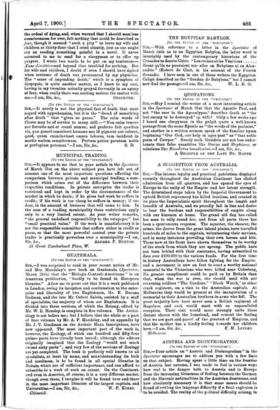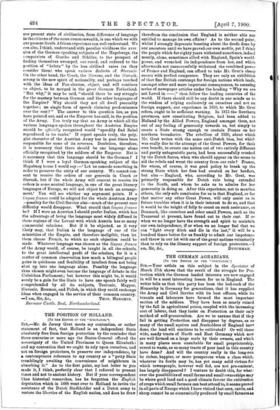AUSTRIA AND DISINTEGRATION.
[TO THE EDITOR OF THE "SPECTATOR."]
SIR,--Your article on "Austria and Disintegration" in the Spectator encourages me to address you with a few lines on that subject. Having spent a little time on the frontier of Austria last autumn, I was made to feel in various ways how real is the danger both to Austria and to Europe from the increasing bitterness of feeling between the German and the Slavonic nationalities in the Austrian dominions, and how absolutely necessary it is that some means should be found of settling the language difficulty if a fatal explosion is to be avoided. The reality of the political difficulty arising, in
our present state of civilisation, from difference of language in the citizens of the same commonwealth, is one which we with our present South African experience can well understand. We can also, I think, understand with peculiar vividness the aver- sion of the German-speaking subjects of the Hapsburgs, the compatriots of Goethe and Schiller, to the prospect of finding themselves swamped, out-voted, and reduced to the position of " helots " by the less civilised races (as they consider them) who speak various dialects of Slavonic. On the other hand, the Czech, the Slovene, and the Slovack, strong in the new spirit of nationality, and perhaps touched with the ideas of Pan-slavism, object, and will continue to object, to be merged in the great German Fatherland. " But why," it may be said, " should there be any struggle for the mastery between German and the other languages of the Empire? Why should they not all dwell peaceably together; no single form of speech claiming predominance over the rest? " The answer to this question lies, as you have pointed out, and as the Emperor has said, in the position of the Army. You truly say that an Army in which all the various languages spoken throughout the Austrian Empire should be officially recognised would "speedily find Babel reproduced in its ranks." If report speaks truly, the poly_ glot character of the Austrian Army has in past times been responsible for some of its reverses. Doubtless, therefore, it is necessary that there should be one language alone officially recognised by the soldiers of the Emperor. But is it necessary that this language should be the German ? I think if I were a loyal German-speaking subject of the Hapsburg house I would say:—` Let us concede something in order to preserve the unity of our country. We cannot con- sent to receive the orders of our generals in Czech or Slovaok, but if the whole Army will consent to receive its orders in some neutral language, in one of the great literary languages of Europe, we will not object to such an arrange- ment.' You will see whither my argument points. If a lingua franca could be adopted for the whole Austrian Army —possibly for the Civil Service also—much of the present race difficulty would disappear. What should that lingua franca be ? If I were an Austrian I should prefer Italian, which has the advantage of being the language most widely diffused in those regions of the Levant with which Austria has so many commercial relations. But if it be objected, as it very likely may, that Italian is the language of one of the minorities of the Empire, and therefore ineligible, then let them choose French, to which no such objection could be made. Whatever language was chosen as the lingua franca of the Army would, of course, be taught in all the schools, to the great intellectual profit of the scholars, for it is a matter of common observation how much a bilingual people gains in quickness and flexibility of intellect from not being shut up into one language alone. Possibly the language thus chosen might even become the language of debate in the Cisleithan Parliament; but however this might be, it would surely be a gain for the State to have one speech fairly well comprehended by all its subjects, Teutonic, Magyar, Slavonic, Rouman, and Polish, in which they could exchange ideas when engaged in the service of their common country.







































 Previous page
Previous page